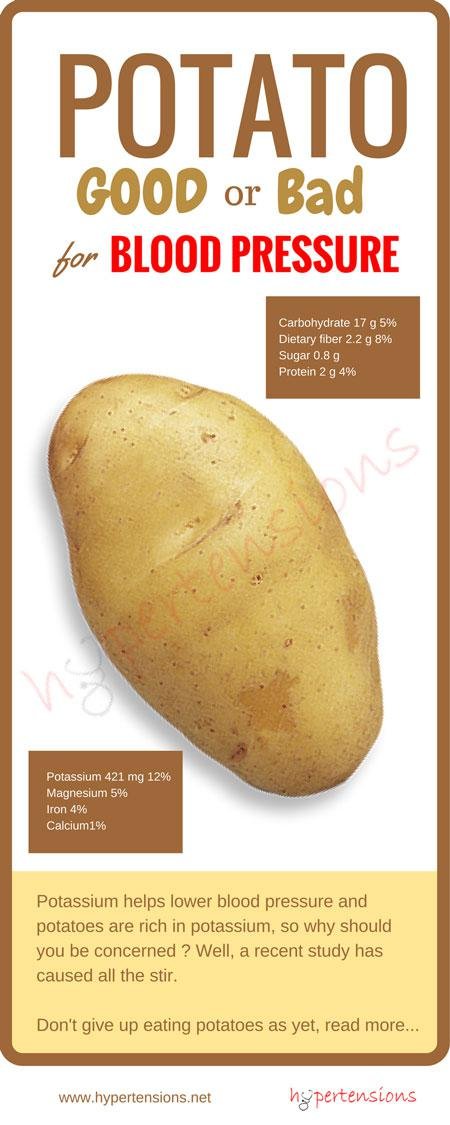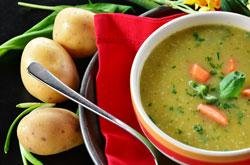Ever wondered if potatoes deserve a starring role on your blood pressure-friendly menu? They're brimming with potassium, a mineral that acts like a bodyguard for your blood pressure, helping to keep it in check.
On the surface, potatoes seem like a clear winner. They're packed with potassium, a mineral renowned for its blood pressure-lowering properties. In fact, a single medium potato boasts a whopping 422mg of potassium, surpassing even the likes of bananas (10% Daily Value) and avocados (13% Daily Value) (1). So, shouldn't potatoes be crowned the king of blood pressure control?
Hold your horses! Recent study published in the BMJ on potatoes and hypertension throws a bit of a curveball. The study suggests that upping your potato intake, even baked, boiled, or mashed, might contribute to higher blood pressure. Sounds confusing, right?
Here's the key to understanding this apparent contradiction: unlike their potassium-rich counterparts like bananas and avocados, potatoes are higher in carbohydrates and lack the benefits of healthy fats, especially monounsaturated fats.
This could be the reason why they might not be the absolute gold standard for blood pressure management, despite their impressive potassium content (2).
Are Potatoes Bad for High Blood Pressure? Unpacking the Research
But wait, there's more to the story! This study relied on self-reported potato consumption, which can be prone to errors in accuracy. Imagine trying to recall exactly how many potatoes you ate last week!
Additionally, it didn't consider other significant factors influencing blood pressure, like salt intake. Let's be honest, most people don't just enjoy plain baked potatoes. They often get dressed up with butter, cheese, sour cream, and other delicious yet sodium-heavy toppings.
These tasty additions are more likely the real culprits behind the potential blood pressure rise, not the innocent potato itself.

Can Potatoes Raise Blood Pressure? It Depends
So, the answer isn't a simple yes or no. While potatoes themselves aren't inherently bad for blood pressure, how you prepare and eat them can significantly impact the outcome. Here's what to consider:
-
Cooking Method Matters: Impact of Potato Preparation on Blood Pressure Healthy methods like baking and boiling retain more nutrients compared to frying. Fried potatoes are higher in fat and calories, which can contribute to weight gain and ultimately, higher blood pressure. Think about it like this: frying adds unnecessary baggage that your body doesn't need.
-
Potassium Powerhouse, But Not the Only Player: Potassium Content in Potatoes vs Bananas While potatoes boast a higher potassium content than bananas, bananas offer additional benefits like fiber, which also helps regulate blood pressure. They can both be part of a blood-pressure friendly diet, each with their own nutritional strengths.
-
Minimizing Potassium Loss: Does Boiling Potatoes Reduce Potassium? Boiling does leach out some potassium, but the loss is minimal, especially if you use the cooking water in another dish like mashed potatoes. To minimize potassium loss further, use minimal water for boiling and steaming.
Making Smart Choices: Healthy Ways to Cook Potatoes for Blood Pressure
So, what does this mean for your love of potatoes? Don't ditch them just yet! Potatoes can still be part of a healthy blood pressure diet with the right approach.
Moderation and simplicity are key. Baked or mashed potatoes with a drizzle of olive oil are perfectly acceptable. Just remember to go easy on the salt and all those other high-sodium toppings.

Considering Alternatives: Best Vegetables for Blood Pressure
While potatoes can be part of a healthy blood pressure diet, incorporating a variety of vegetables is essential for a well-rounded approach. Here are some excellent options known for their blood pressure-lowering properties:
- Leafy Greens: Powerhouses of potassium, magnesium, and nitrates, leafy greens like spinach, kale, and collard greens are champions for blood pressure control. Imagine them as tiny green warriors fighting for your blood vessel health.
- Beets: These vibrant root vegetables are rich in nitrates, which your body converts to nitric oxide, a molecule that helps relax blood vessels and improve blood flow. Think of beets as natural blood vessel relaxers!
- Celery: This crunchy veggie contains a unique compound called phthalides, which may help lower blood pressure by relaxing blood vessel walls. Imagine celery as a natural stress reliever for your blood vessels.
Long-Term Effects of Potatoes on Blood Pressure: Need for More Research
More research is needed to fully understand the long-term impact of potatoes on blood pressure. However, the current evidence suggests that it's likely the combination of potatoes with unhealthy toppings and cooking methods, rather than the potatoes themselves, that might be detrimental.

